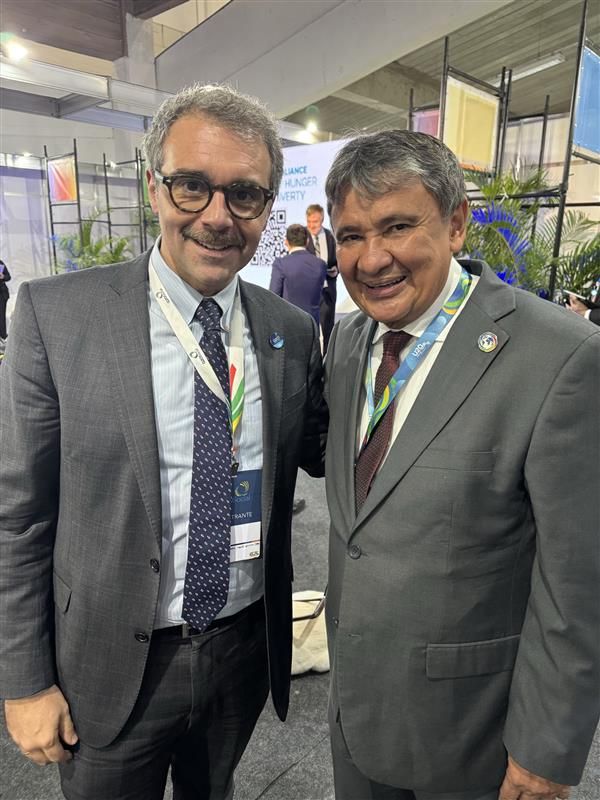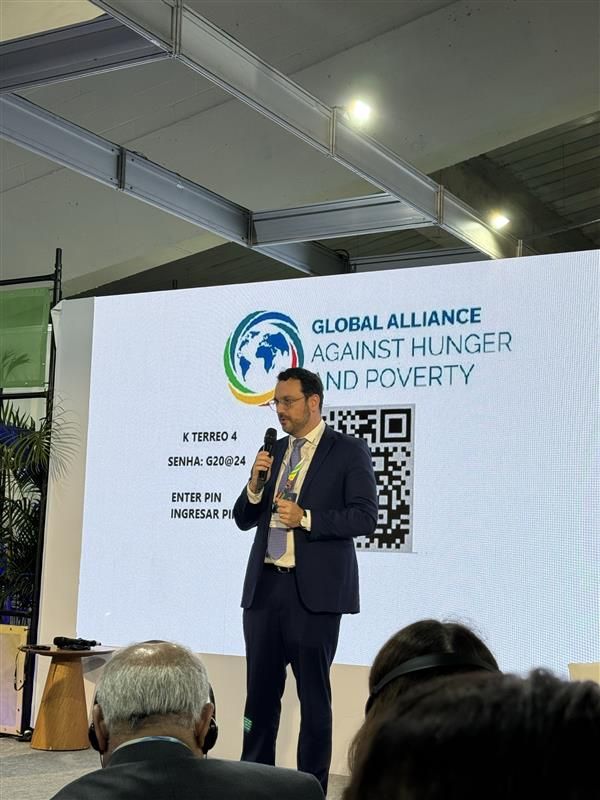

UNIDO joins the Global Alliance against Poverty and Hunger
18 November 2024

RIO DE JANEIRO, 18 NOVEMBER 2024 – At the nineteenth meeting of the Group of Twenty (G20), Brazil, as the president of the G20 in 2024, announced the official ratification of the Global Alliance Against Hunger and Poverty.
The Alliance is the flagship initiative of the G20 agenda priority ‘social inclusion and the fight against hunger’, which comprises of participating G20 countries, academic institutions international organizations, including UNIDO, and which seeks to support and accelerate efforts to eradicate hunger and poverty, while reducing inequalities, through the implementation of new policies. Ultimately, the Alliance will serve as a platform where members seeking assistance for the development, implementation, or expedited execution of public policies aimed at SDGs 1 and 2 can connect with partners willing to offer expertise or financial backing to advance these endeavors.
In a video message , speaking from UNIDO's flagship World Without Hunger Conference in Addis Ababa, Ethiopia, Director General Müller said: " A world without hunger is possible! That is what we are showing here at our World Without Hunger Conference. We have the knowledge and the technology to end hunger and poverty in the world. It is just a question of political will and the necessary investments! I am very grateful to the Government of Brazil, President Lula, for putting this most important topic at the top of the global agenda. I am proud to announce that UNIDO has joined the G20 Global Alliance Against Hunger and Poverty as a founding member!"
Indeed, in 2023, more than 733 million people worldwide faced hunger, and more than 2.3 billion were confronted with moderate to severe food insecurity. In 2030, over 580 million people will be chronically undernourished in 2030. It is thus crucial to tackle hunger and poverty from different, complementary angles, and the Alliance will focus on supporting national public policies, ideally derived from evidence-based solutions and programme-level implementation. In addition, the Alliance will focus on the creation of synergies and coordination among development partners towards achieving a more efficient resource mobilization and allocation, including through information and knowledge exchange.
UNIDO stands ready to support Alliance member governments in implementing, improving or scaling-up policy instruments referenced in the Global Alliance’s basket of policy instruments, including infrastructure development in under-privileged areas and market infrastructure development inter alia through its Integrated Agro Industrial Parks (IAIP) programme; inclusive value addition and processing with its Special Agro-Processing Zones (SAPZ) programme; promotion of short value chains for example by upgrading food-processing systems; and training and skills upgrading epitomized by its Public Private Development Partnership (PPDP) model that increases private sector engagement and investment in Technical and Vocational Education and Training (TVET) governance.
Clearly, UNIDO’s approaches demonstrate the intrinsic connection between productive infrastructure, structural transformation, innovation, value adding employment and income generation in the agri-business and rural space, and how they directly contribute to SDG 9 as well as others SDGs prioritized by the Global Alliance against Hunger and Poverty.
UNIDO is committed to support the Global Alliance's objectives by promoting sustainable supply chains and developing industrial decarbonization, energy efficiency and circular economy practices. UNIDO will also work with G20 countries and other international organization to end hunger by cutting post-harvest losses, developing agribusiness value chains and elevating infrastructure development in under-privileged areas while promoting technology and knowledge transfer, digitalization, investment promotion, training and skills, the circular economy, and women’s economic empowerment.
In addition, UNIDO will contribute to the 2030 Sprint for School Meals, which was announced as part of the 2030 Sprints Announcements for the Global Alliance Against Hunger and Poverty, which was held on 15 November 2024.
With the collective aspirational goal of reaching at least an additional 150 million school children with national-scale school meals programmes by 2030, UNIDO will expand its partnership with Tetra Pak to reach out to more schools and more children within Yemen, as well as to develop and deploy similar initiatives in other countries.
The programme will work on driving both the provision of school meals and the development of local dairy value chains, by working with small-holder farmers to enhance production, therefore achieving local food security.
Delivering on a request by the G20, UNIDO also launched at a dedicated event at the G20 Social Summit on 15 November in Rio de Janeiro the report “The Role of the G20 in Promoting Green and Just Transitions”, together with ILO, UNCTAD and the OECD. The report explores the need and scope of improving the coherence of interrelated policies, including a new generation of inclusive and sustainable industrial policies, to drive green and just transitions to meet climate and sustainable development goals.
For more information, please contact: a.badarneh@unido.org and g.desimone@unido.org

